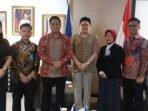Jakarta – The Pantun tradition has been designated as an Intangible Cultural Heritage on 17 December 2020. The determination took place at the UNESCO meeting of the 15th session of the Intergovernmental Committee for the Safeguarding of the Intangible Cultural Heritage at UNESCO Headquarters in Paris, France. Director General (Dirjen) of Culture, Ministry of Education and Culture, Hilmar Farid said this momentum is the first step to preserve the tradition of Pantun.
“This is not the end of the struggle, but the first step for all of us to preserve this noble tradition. All stakeholders should move together and unite their determination with one goal: to keep Pantun alive and not lost to the times, ” said Hilmar Farid in a media conference that took place in Jakarta, Friday (18/12).
Hilmar Farid further appealed to the studios to continue to be fostered in order to grow and develop. “Communities are encouraged, prepare teaching materials so that students are encouraged to use rhymes, and give awards to those who dedicate their lives to preserving Pantun,” he added.
For your information, the Pantun nomination proposed by Indonesia and Malaysia is the 11th Indonesian cultural tradition recognized by UNESCO., Pencak Silat was encrypted as an Intangible Cultural Heritage on December 12, 2019.
UNESCO considers Pantun to have an important meaning for the Malay community not only as a means of social communication but also rich in values that serve as moral guidelines. The message conveyed through the Pantun emphasizes the balance and harmony of human relations.
“Pantun provides a place to express ideas, entertain, or communicate between people, regardless of race, nationality, or religion. The Pantun tradition encourages mutual respect between communities, groups, and individuals, ” explained Hilmar Farid.
For Indonesia, they cannot separate the success of establishing Pantun as an Intangible Cultural Heritage from the active involvement of various stakeholders, both the central and local governments, and various related communities. For example, the Oral Tradition Association (ATL), Malay Customary Institution, Dangdung Morro Joget Community, Sungai Six Dangdung Joget Community, Penyengat Island Gazal Community, Mak Yong Heritage Theater Studio, Kijang Keke Village, and several Indonesian individuals and singer.
On this occasion, Hilmar Farid appreciated and thanked all parties who had contributed their energy and thoughts to nominate Pantun, both in Indonesia and in Malaysia. The determination of the Pantun is proof that we can work together with other countries to propose the cultural heritage we have.
Representative of the Permanent Delegation of the Republic of Indonesia to UNESCO, Surya Rosa Putra in his statement said that as the first Indonesian nomination to be submitted together with other countries, the inscription of Pantun has important meaning for Indonesia and Malaysia. “(Pantun) reflects the closeness of two allied countries who share Malay identity, culture and traditions,” he said.
Meanwhile, for the Malay community, Pantun has an important role as an instrument of social communication and moral guidance that emphasizes balance, harmony and flexibility of relationships and interactions between people in their poetry. Today, not only as a Malay identity, Pantun has also become a supporting medium in empowering the creative economy.
Pantun is a form of Malay poetry that is used to express ideas and emotions in which there is the art of conveying metaphorically using subtle and polite language. As an oral tradition, Pantun is taught by elders and traditional leaders to the younger generation through the activities of daily life, as well as through more formal rituals and customs.
Hilmar Farid explained that pantun is the most widespread oral form in Southeast Asia and has been used in this region for at least 500 years. Pantun is a means of expressing love, with more than 70% of the lyrics devoted to expressing love for a partner, family, community, and nature.
Going forward, Indonesia and Malaysia are committed to continuing to make various efforts to ensure the protection of Pantun as an Intangible Cultural Heritage through active involvement of local communities in both countries. Pantun is also preserved by being taught formally in schools and through artistic activities.
“Let us show our care for Pantun. Use it to open or close events, both formal and informal activities, or on various other occasions. Pantun can be used by anyone and anywhere. Do not be ashamed and hesitate to chant, “said Hilmar.
Anang










